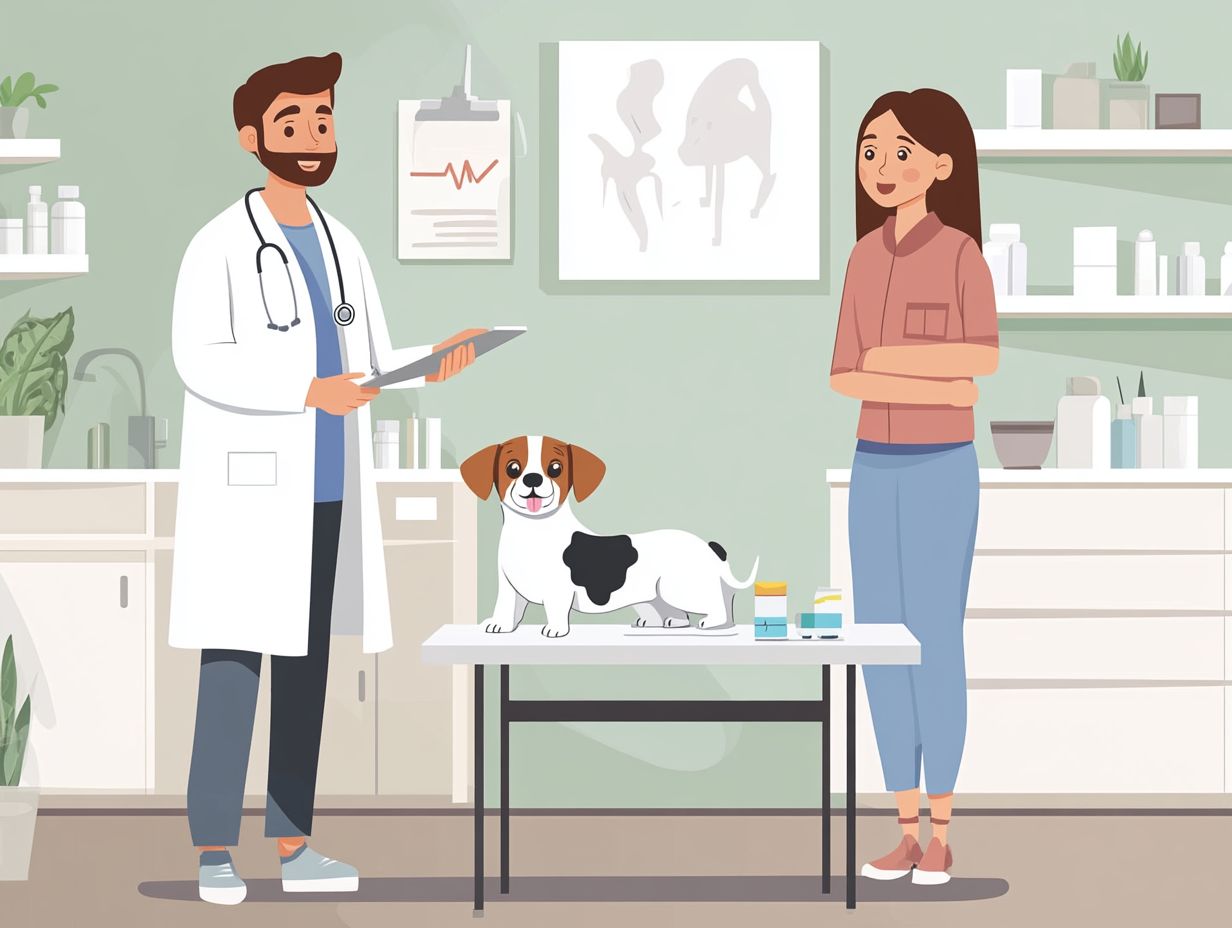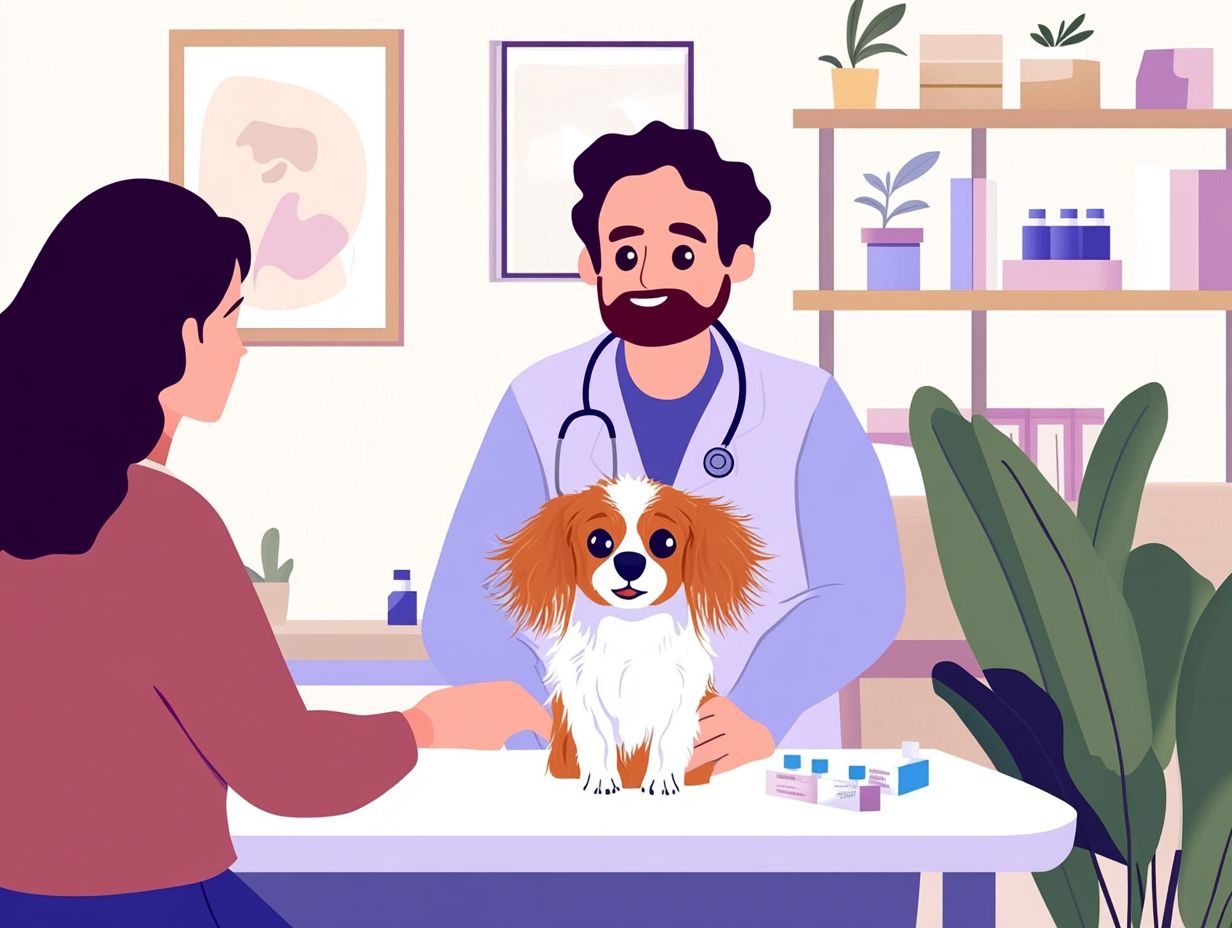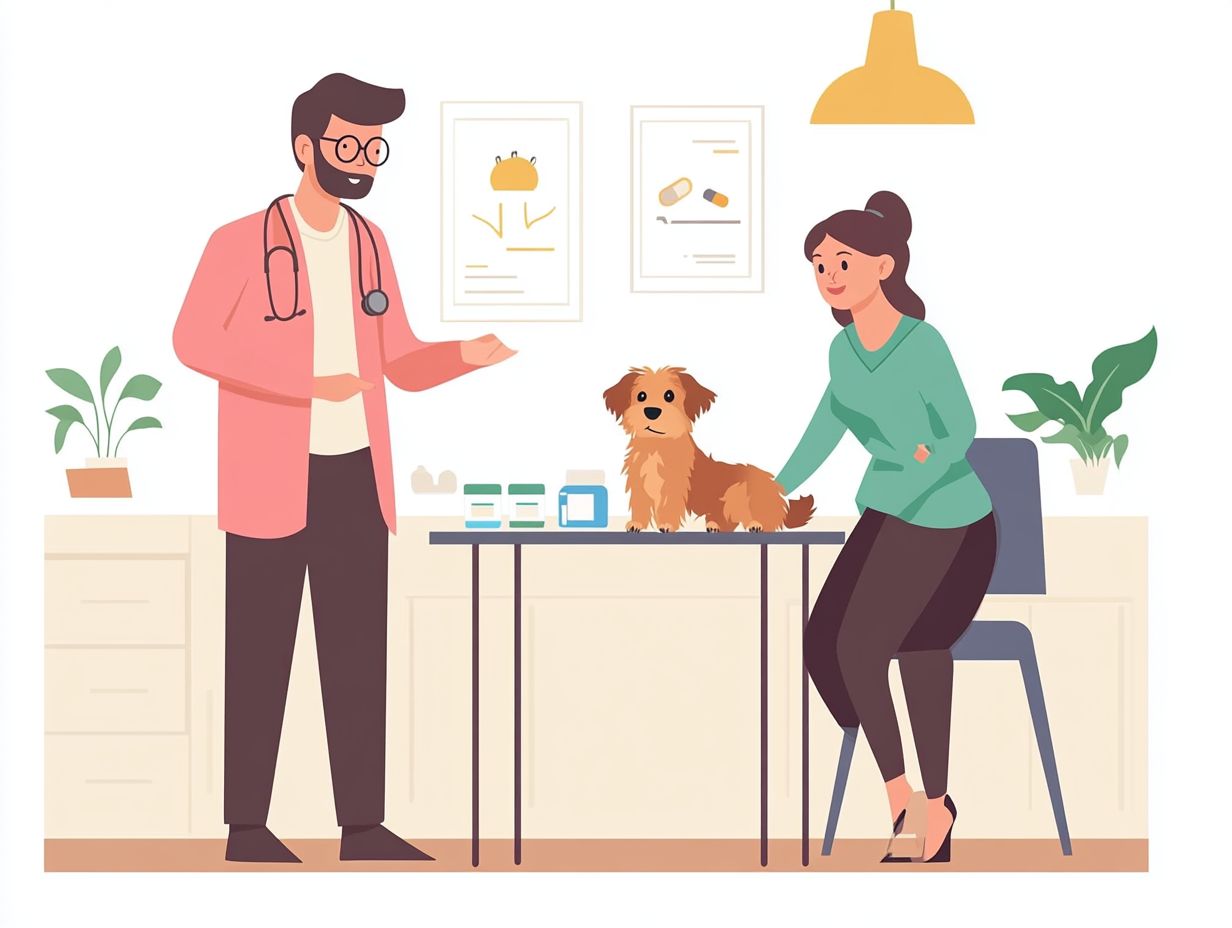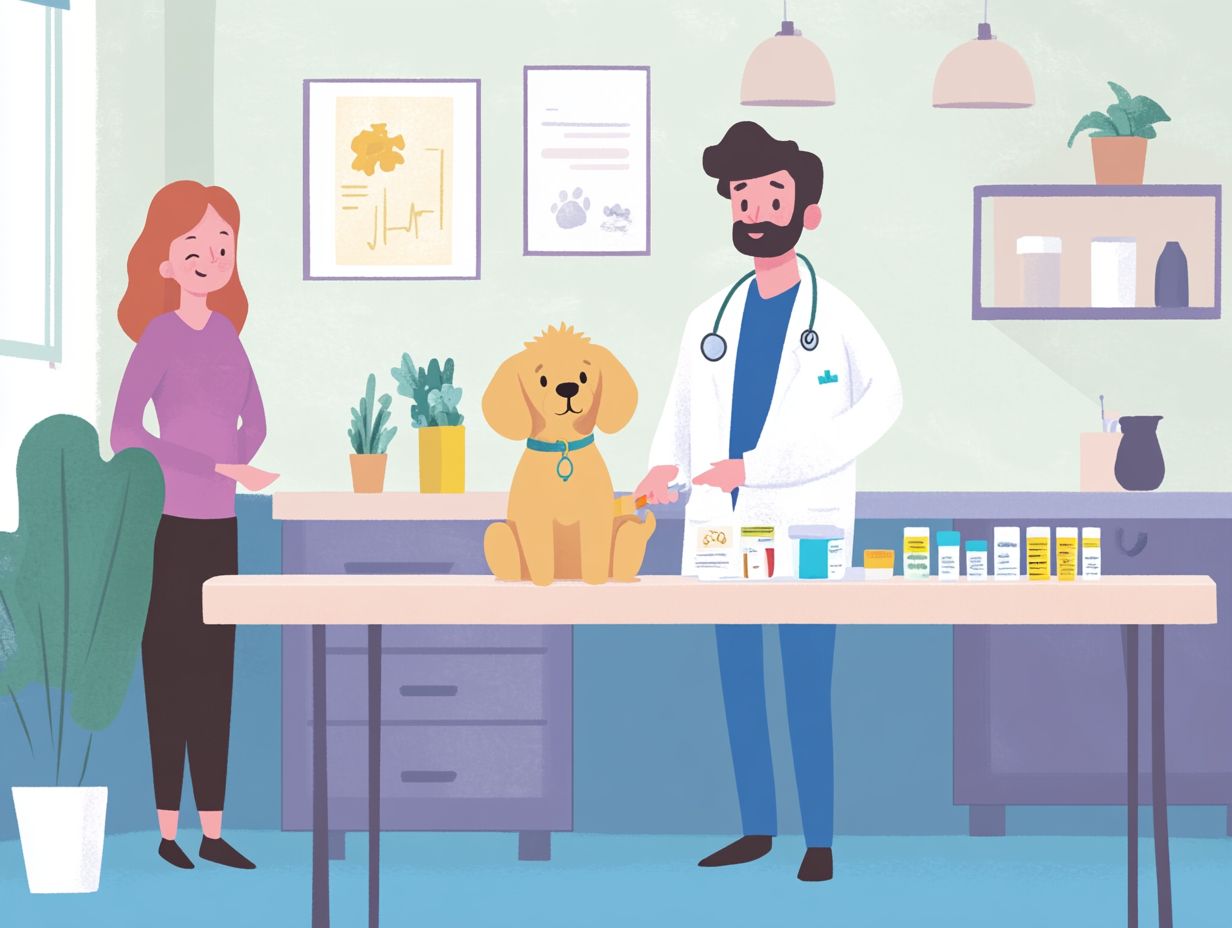How to Choose the Right Anxiety Treatment for Pets?
Dog anxiety is an increasingly pressing issue for many dog owners. It impacts everything from your furry friend s behavior to their overall well-being, including conditions like separation anxiety and general anxiety.
It s essential for dog owners to understand pet anxiety now! Understanding the underlying causes and symptoms is crucial for offering the right support. This article delves into a range of treatment options, including behavioral therapy and medication, while considering the unique needs and personality of your pet.
You ll also find insights into alternative remedies and the significance of working closely with a veterinarian to achieve the best possible outcomes. Discover how you can create a calmer, happier environment for your beloved companion.
Contents
- Key Takeaways:
- Understanding Pet Anxiety
- Types of Anxiety Treatments for Pets
- Factors to Consider When Choosing a Treatment
- Cost and Availability
- Alternative and Complementary Treatments
- Working with a Veterinarian
- Frequently Asked Questions
- What are the common anxiety treatments for pets, including anxiety supplements?
- How can I determine the right anxiety treatment for my pet, considering options like short-acting medication?
- Can natural remedies be effective in treating pet anxiety?
- Is medication necessary for treating pet anxiety?
- Are there any side effects of anxiety treatments for pets?
- Can I combine different anxiety treatments for my pet?
Key Takeaways:

- Pet anxiety has various causes and symptoms, and it’s crucial to understand them to choose the right treatment.
- When choosing a treatment for your pet’s anxiety, consider their individual needs and personality, as well as the cost and availability of the treatment.
- In addition to traditional options like behavioral therapy and medication, alternative and complementary treatments such as natural remedies and therapeutic techniques can also be effective in managing pet anxiety.
- It’s important to work with a veterinarian when choosing an anxiety treatment for your pet, as they can provide professional guidance and expertise to ensure the best possible outcome.
Understanding Pet Anxiety
Understanding pet anxiety is crucial for dog owners, given the range of anxiety disorders that dogs can experience think separation anxiety, noise anxiety, and general anxiety. These issues may present themselves through physical symptoms like panting or trembling, alongside behavioral signs such as excessive barking or destructive tendencies.
By recognizing these indicators, you can enhance your approach to dog behavior management, ultimately fostering better mental health for your dog. Consulting a veterinary behaviorist, a vet who specializes in animal behavior, can offer valuable insights into the emotional connections that might drive anxiety triggers. This is a key element for effective treatment and intervention.
Causes and Symptoms
The causes of dog anxiety can vary widely. They range from separation anxiety to noise sensitivity triggered by loud sounds and other anxiety triggers that can impact your dog s overall well-being. You will notice symptoms that can have a big impact on your dog s life!
For example, a sudden thunderstorm can send some dogs into a panic, while others may feel stressed during fireworks. Changes in routine, like moving to a new home or welcoming a new family member, can disrupt your dog s sense of security, leading to more anxiety.
You might observe physical signs of this anxiety, such as trembling, excessive barking, or even panting. Behavioral responses could include destructive habits like chewing furniture or digging, reflecting your dog s struggle to cope with overwhelming stressors. Recognizing these symptoms is crucial for you as a pet owner, ensuring that your furry companion remains emotionally healthy and happy.
Types of Anxiety Treatments for Pets
When tackling dog anxiety, you have a range of treatment options at your disposal. These can include behavior modification techniques, methods to change how your dog behaves, and medication, all supervised by qualified pet anxiety professionals.
You can select from various anxiety medications and supplements designed to address specific symptoms. This allows you to create a tailored approach to enhance your dog’s mental well-being.
Take immediate steps to help your pet by consulting with a veterinarian today!
Behavioral Therapy
Behavioral therapy is truly a cornerstone in tackling dog anxiety. It highlights the significance of a structured training plan often crafted by a veterinary behaviorist. Act now to help your dog feel more secure and calm!
By employing training methods alongside exercise and enrichment, you can effectively alleviate anxiety symptoms and enhance your pet’s quality of life.
Consider methods like desensitization, which involves gradually exposing your dog to anxiety-inducing stimuli to help them adjust over time. Coupled with counter-conditioning, where you replace negative associations with positive experiences, these strategies can significantly elevate your training approach.
When you integrate regular physical activities, such as walks and play, you help your dog feel balanced and relaxed. Incorporating mental stimulation through interactive toys or puzzle games keeps your dog engaged and reduces stress, fostering a sense of security and well-being.
Ultimately, a comprehensive plan that combines behavioral therapy with enrichment and exercise is essential for helping your dogs thrive in the face of anxiety.
Medication Options

Medication options for dog anxiety can vary widely, ranging from short-acting solutions for immediate relief to longer-term medications designed to reduce overall symptoms. By collaborating with veterinary professionals, you can ensure that the treatment you choose aligns perfectly with your dog’s specific needs while taking into account any potential side effects.
Among these options, you ll typically find SSRIs, which are Selective Serotonin Reuptake Inhibitors that help increase the calming hormone serotonin, and benzodiazepines, which deliver quick relief by enhancing the effects of a neurotransmitter called GABA. Each medication type comes with its own set of advantages; for example, SSRIs might be ideal for dogs that require consistent long-term management, whereas benzodiazepines are often more suitable for addressing situational anxiety, like during thunderstorms.
Veterinary professionals play a crucial role in this process, assessing your dog’s overall health and providing invaluable insights on potential interactions with other medications or underlying conditions. To understand the financial aspect of treatment, it’s important to consider the costs of treating pet anxiety. This holistic approach is essential for managing anxiety effectively and ensuring your furry friend finds peace.
Factors to Consider When Choosing a Treatment
Regarding choosing the right treatment for your dog’s anxiety, there are several crucial factors to consider. You’ll want to evaluate your pet’s unique needs and personality, along with understanding whether medication is necessary for pet anxiety, alongside the cost and availability of different treatment options.
Understand these factors to make the best choices for your dog. This way, you can make informed decisions that are truly personalized for your beloved companion.
Pet’s Needs and Personality
A dog s needs and personality are crucial in shaping the most effective strategy for managing anxiety. Different breeds can respond in unique ways to various training methods and anxiety triggers. By customizing your approach to align with your dog s individual behavior, you can achieve more successful outcomes.
Take German shepherds, for example. Their intelligence and protective instincts thrive under structured training that reinforces their roles and builds confidence. On the other hand, a Labrador retriever, with its friendly and sociable disposition, might benefit from gentle exposure to new environments and positive reinforcement to ease anxious moments and support their mental health holistically.
By understanding these unique traits, you not only enhance the effectiveness of treatment options but also foster a deeper bond between you and your dog. This personalized approach might include behavioral therapy, specialized training, or engaging in enrichment activities that cater specifically to each breed’s needs, ultimately paving the way for a secure and calm canine companion.
Take the first step towards a happier, healthier dog today by exploring treatment options and consulting a professional!
Cost and Availability
Cost and availability are pivotal considerations when exploring anxiety treatment options for your dog. Veterinary visits can vary significantly in price, along with the costs of anxiety supplements and medications. Additionally, exploring natural remedies for pet anxiety can also be a valuable part of your approach. Understanding these financial aspects enables effective planning for your pet’s mental health needs.
When evaluating financial implications, recognize that vet visit costs can fluctuate widely, often influenced by the clinic s location and specialization. Prescription medications for anxiety come with their own prices, which can add up, especially if ongoing treatment is necessary.
If you’re searching for more budget-friendly alternatives, consider natural supplements, calming treats, and behavioral therapies. These options can yield promising results without straining your wallet. Each treatment pathway has its own cost range, allowing you to find a solution that meets both your dog’s needs and your financial situation.
Alternative and Complementary Treatments
Explore exciting options like natural remedies, therapeutic techniques, and anxiety supplements to elevate traditional methods of managing dog anxiety.
By incorporating these alternatives, you can create a holistic approach that effectively manages your canine’s anxiety, ensuring a more balanced and harmonious life for both of you.
Natural Remedies and Supplements

Natural remedies and anxiety supplements are gaining traction among dog owners, offering a holistic approach to managing your canine’s behavior and anxiety. These supplements can help alleviate symptoms and promote a sense of calm without the side effects often linked to conventional medications.
Herbal supplements, such as valerian root and chamomile, are well-regarded for their calming properties and may assist in reducing stress and excessive barking. Homeopathic options like Rescue Remedy provide a gentle treatment focusing on the emotional aspects of anxiety, aiming to restore balance and tranquility.
Understanding how these remedies work is key; many interact with your dog’s natural biology to support relaxation. It s essential to consult with a veterinarian, as some ingredients may not be suitable for every dog, particularly those with underlying health conditions.
Therapeutic Techniques
Therapeutic techniques are essential for addressing dog anxiety. Approaches like exercise and enrichment nurture a sense of security and well-being. Implementing a structured training plan can significantly enhance your dog’s behavioral improvement and emotional stability.
Incorporating mindfulness exercises helps your dog stay present and reduces anxiety triggers, while organized play sessions facilitate bonding and elevate their overall mood. You can also manage the environment by creating a calming space or using calming aids to alleviate anxiety.
Recognizing your dog’s unique triggers allows you to develop a comprehensive training plan that integrates diverse techniques, fostering harmony in their life. This ultimately leads to a calm, confident pet that thrives in their environment.
Working with a Veterinarian
Collaborating with a veterinarian is crucial for effectively managing your dog’s general anxiety. Their expert guidance helps identify specific needs and customize treatment options tailored to your pet.
Engaging with a veterinary behaviorist can provide invaluable insights and strategies that significantly enhance your dog’s mental health and overall well-being. Don’t hesitate to consult your vet today for the best plan for your dog’s anxiety management!
Importance of Professional Guidance
Seeking help from a veterinary behaviorist is crucial for managing dog anxiety. Their expertise in understanding how dogs act allows them to provide tailored treatment options that significantly improve your dog s quality of life.
Through personalized assessments, they can identify specific triggers and underlying causes of anxiety. This approach ensures that the treatments are relevant and increases the likelihood of success.
They craft targeted treatment plans that include behavior modification techniques. When necessary, they may recommend anxiety medication to alleviate symptoms. Additionally, they guide you through implementing effective strategies for pet anxiety to ensure your dog’s long-term well-being.
This collaboration helps you really understand your dog s feelings, creating a stronger bond!
Frequently Asked Questions
What are the common anxiety treatments for pets, including anxiety supplements?

There are various options for treating anxiety in pets, including behavioral therapy, medication, natural remedies, and alternative therapies. For those interested in a comprehensive approach, exploring best practices for pet anxiety training can be particularly beneficial.
How can I determine the right anxiety treatment for my pet, considering options like short-acting medication?
The best way to find the right treatment is to consult with a veterinarian. They will assess your pet’s individual needs and recommend the most suitable options, including therapy for anxious pets and anxiety medication.
Can natural remedies be effective in treating pet anxiety?
Yes! Some natural remedies, such as pheromone sprays, herbal supplements, and essential oils, can effectively treat mild pet anxiety. This is especially true for dogs like Labrador retrievers and German shepherds.
However, it’s important to discuss these options with your vet before using them.
Is medication necessary for treating pet anxiety?
In severe cases of pet anxiety, such as canine compulsive disorder, medication may be necessary. Your vet can prescribe appropriate medications and monitor your pet’s progress.
Are there any side effects of anxiety treatments for pets?
Some medications might have side effects, but they are usually temporary and manageable. Natural remedies may also cause side effects, so it’s important to discuss these with your vet beforehand.
Can I combine different anxiety treatments for my pet?
In some cases, combining different treatments, including anxiety supplements, may be necessary for optimal results. To learn more about specific strategies, check out how to encourage calm behavior in anxious pets. However, consult with your vet before mixing any treatments, as they could interact.
Don’t wait! Consult your vet today to find the best treatment for your furry friend!






